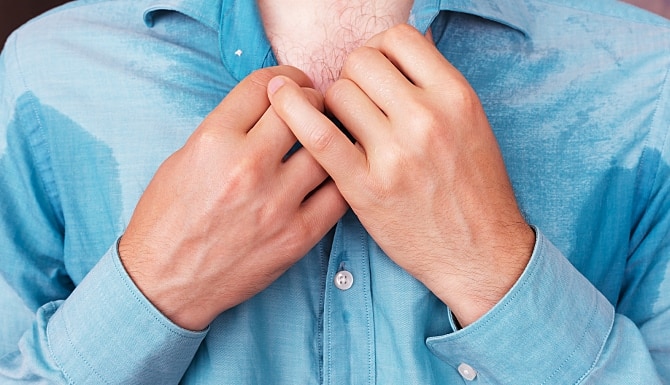Sweating is the worst. Sure, you know that it keeps you cool, but it also stinks, feels uncomfortable, is a source of embarrassment and can ruin a good time. The twin forces of time and Mother Nature have perfected the human body into an incredible and highly adaptable machine, and every awkward noise, smell and excretion your body produces probably serves a purpose. It's time to cast your sweat glands in a new light. While you can still try to keep them at bay in social situations, a little knowledge will at least help you appreciate your super-cooling system.
How Do You Sweat?
Sweat glands are exocrine structures — that is they produce and secrete bodily substances. Glands can be divided into two categories, according to the Mayo Clinic: eccrine and apocrine.
Eccrine glands are located almost everywhere on your body and their role is to keep you cool. These guys give humans a relative super power over most animals: long distance running, which is what helped our ancestors run down dinner in the desert. Very cool. Eccrine sweat is mostly water, and you'll soon find out why that's important.
Apocrine glands are found mostly in your armpits and other places that are abundant in hair follicles. While the sweat from these apocrine glands doesn't smell on its own, these glands are located in the dark corners of your body where bacteria thrives. It's the bacteria feeding on the sweat that causes body odor.
Apocrine sweat is not composed like eccrine sweat. Apocrine sweat contains fat in the form of oils, rather than water, providing more food for the bacteria. Thus, it results in a stronger odor. Apocrine glands are also most active when you're under emotional stress.
Before you wish away all your apocrine glands, know that some of these glands produce useful things like tears and earwax, which are essential to human biology, according to the National Institutes of Health.
Why Do You Sweat?
Keeping cool is the obvious answer. The ability to take advantage of the physics of evaporation is one of the crucial assets that helped humans get to the top of the food chain. So what, you say? This cooling allowed primitive men to function in the heat while their exhausted prey collapsed. Antelope steaks for the entire village for a week! Some people in the Kalahari Desert still practice persistence hunting today, reports Louis Liebenburg in Current Anthropology. Sweating is what makes humans the ultimate long-distance athletes.
But sweating is a social inconvenience. Go ahead and cover it up if you must (and in most cases, you really should!). While you're on the topic of sweat glands, consider again the difference between deodorants and antiperspirants. Deodorants are there just to help control your odor. The aluminum-based compounds used as the active ingredients in antiperspirants actually enter the sweat gland, swell with moisture and help block further fluid from excretion.
Sweat glands make modern social life awkward at times. If you keep running through these cool facts though, maybe you'll learn to appreciate them and curse them less often.
This article was brought to you by Colgate-Palmolive Company, the makers of Speed Stick products. The views and opinions expressed by the author do not reflect the position of the Colgate-Palmolive Company.

